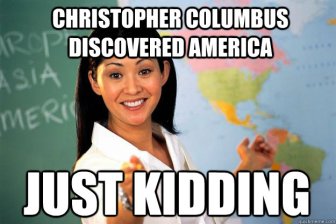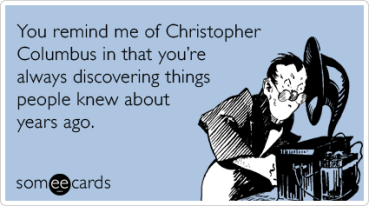Columbus commonly gets credit for discovering America…At the time, however, the American continent was already populated. The Indians, we must assume, had discovered America long before anybody else ever got here!
This is from a 1963 kids’ history book (Do You Know Who Did It? by Virginia Coigney*), and is fairly typical of how we talk about the discovery of America. It’s unlikely, at least in some (e.g. my) demographics, that you could say “Columbus discovered America” at a party without someone jumping in and saying, “Well, actually….” I remember in college a professor launching into a long monologue about how ridiculous it is to claim that Columbus discovered anything. The class was delighted, and laughed merrily. I thought something was off about the monologue, but the basic idea — that whatever Columbus had done it was not discovery — had been such a commonplace for so long (Coigney was writing in 1963, remember) that it took me a while to realize where the problem was.
a professor launching into a long monologue about how ridiculous it is to claim that Columbus discovered anything. The class was delighted, and laughed merrily. I thought something was off about the monologue, but the basic idea — that whatever Columbus had done it was not discovery — had been such a commonplace for so long (Coigney was writing in 1963, remember) that it took me a while to realize where the problem was.
Now, I’m not here to defend Columbus, his actions, policies, or legacy. I’m just here to say one thing: Columbus discovered America, and while denying this fact is a fabulous way to signal your demographic, it requires a tortuous logic and an isolated demand for specificity.
Let me elaborate. This is a perfectly good English sentence that I might say, and probably have, to a friend: “I discovered a great used book store this weekend.” Here’s another: “I discovered a new comic book series to read.”

*Living, presumably.
No one, hearing one of these sentences, has ever jumped in and said, “Well, actually I doubt you are the first customer ever to find that book store!” Because everyone knows what I mean. Similarly, no one has ever heard the sentence “Columbus discovered America” and thought “Well, I guess that means all these Native Americans showed up right after he did.”
I’m not naive enough to believe that the true meaning of a word is revealed by its etymology, but here it’s helpful and pretty obvious. Look at the word, dis-cover. Like apocalypse, it literally means an uncovering, a revealing. (This may be a different meaning than discovering a book store, but it’s still a meaning of “discover.”)
Presumably some number of millennia ago, someone in Siberia discovered the Bering Bridge; presumably one or more people then discovered to others the presence of this bridge, leading to one or more mass immigrations. Perhaps when the Bering Sea made this discovery no longer relevant, but at any event at some point long before  history as such began, this discovery was forgotten.
history as such began, this discovery was forgotten.
One millennium ago, 500 years before Columbus, Leif Erikson discovered America to Greenlanders and therefore to Icelandics and the larger Scandinavian community. Word did not get much further, and it was almost entirely forgotten in any case, surviving only in half-legendary records, and considered by many to be myth (until archeology proved otherwise).
You can dig up your Kon-Tiki or Zheng He and assert that other people are discovering America, too. I’m not equipped to evaluate these claims beyond my general assumption that nothing is true (and everything is permitted); but people may have discovered (as in stumbled upon) America and people may have discovered (as in disclosed) America many times.
And Columbus then discovered America (or its outlying islands) in 1492, and discovered it to Spain, and thence to Europe, and thence to the Old World entire. It was never forgotten. Unlike the Vinland experiment, or Zheng He’s hypothetical treasure voyage, mere footnotes in history,** Columbus’s voyage is the most important event in the history of the New World; not the pre-history of the New World, of course, but the most important in its history. Because Columbus wrote it all down. Barring some kind of weird isolationism/ apocalypse combo, it is a discovery that will never be forgotten. There have been other discoveries, but this is the discovery.
World entire. It was never forgotten. Unlike the Vinland experiment, or Zheng He’s hypothetical treasure voyage, mere footnotes in history,** Columbus’s voyage is the most important event in the history of the New World; not the pre-history of the New World, of course, but the most important in its history. Because Columbus wrote it all down. Barring some kind of weird isolationism/ apocalypse combo, it is a discovery that will never be forgotten. There have been other discoveries, but this is the discovery.
Look, I’m not trying to exploit some semantic loophole. The point is that this is a perfectly natural way of using the word discover. But, probably more relevantly, what is important about the concept of “discovery” is not being the first person to blunder into something: what is important about discovery is communicating the fact to others and thereby changing the world. Leif Erikson is interesting, but he is not very important; hypothetical Zheng He, even less so.

Americas mapped.
The eecard above makes this elementary blunder. Before Columbus, some people knew about America; after Columbus, all people knew about America (eventually). Furthermore, the pre-Columbian Americans only sort of knew America, because they had no knowledge remaining of the old Siberian homeland, and therefore had nothing to compare the New World to. Columbus may have only dimly grasped what he had discovered, but he set his discovery in a relative position on a map. Aliens kidnapping and interrogating a pre-Columbian Native American would learn little about the composition of the Earth; within a few decade of Columbus, alien interrogation of an educated European would give not an exact coastline but the salient facts. Native American knew they lived somewhere; post-Columbian cartographers knew they lived in America.
What “counts” as discovery may go by somewhat arbitrary rules (Erikson was not the first Norseman to sight America, for example, but still gets the Viking credit) but by and large we very often use with explorers the idea that not the first person to visit but the first  person to chart a place, scientifically or officially, is its discoverer. Speke was hardly the first person to dip his feet in the source of the Nile, but he was the first person to know that it was the source of the Nile; that it had a latitude and longitude; that it could be delineated in a way such that others could find it in the future. Similarly, Newton was not the first to be hit in the head with a falling object (RIP Pyrrhus).
person to chart a place, scientifically or officially, is its discoverer. Speke was hardly the first person to dip his feet in the source of the Nile, but he was the first person to know that it was the source of the Nile; that it had a latitude and longitude; that it could be delineated in a way such that others could find it in the future. Similarly, Newton was not the first to be hit in the head with a falling object (RIP Pyrrhus).
So if someone says, in your presence, “Columbus discovered America,” you should feel free to say, “Well, actually, if you artificially restrict ‘discover’ to only one of its meanings, and overlook any ideas of historical importance or how we usually use words, then he did not!” And you can bask in your conditional triumph.
*The book lacks the courage of its convictions. Its next chapter is titled “Who Discovered the Pacific Ocean?” and the answer is “Balboa.”
** Some people think Columbus knew of and was inspired by the Vinland story, which would make it more than a footnote. I am not persuaded.
Recent Comments